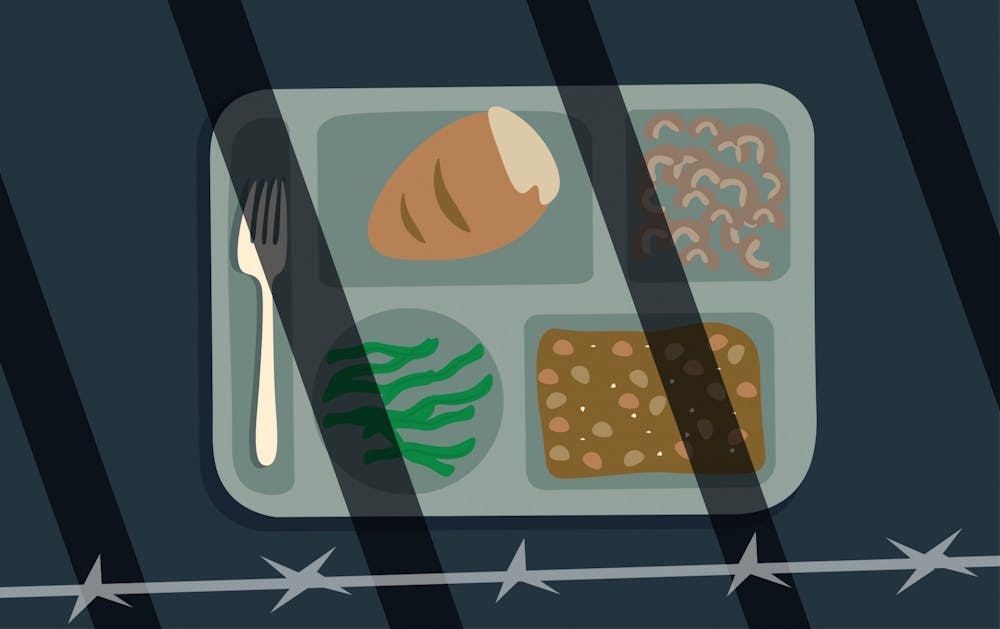One way for ASU to end the perpetuation of harm toward vulnerable populations is by ending business ties with food-service provider Aramark.
The multi-billion dollar corporation’s services are widespread on ASU campuses: in the dining halls, convenience stores like the POD and many on-campus restaurants. Beyond working with universities, Aramark also provides food in prisons and jails.
Students demand that the University cancels its contract with the company. A petition of students demanding the University cancels its contract with the company was created by Tori Vandekop, a senior studying communication. The petition has over 1,300 signatures as of Tuesday.
Looking at the company’s misdeeds, this course of action is justified.
READ MORE: Missing the mark
One issue with Aramark is that it fuels the prison-industrial complex. This term refers to both privately-owned prisons and corporations providing services in prisons and financially benefitting from people’s imprisonment.
The prison-industrial complex presents a serious problem.
“The intersection of capital accumulation and mass incarceration creates a perverse incentive for incarceration,” said Richard Glover, a graduate student studying justice studies and adjunct faculty member at School of Social Transformation.
While companies like Aramark are not the root cause of mass incarceration, Glover said when businesses use prison labor or provide services in prisons, they are invested in perpetuating incarceration.
"That means all of these companies have an interest in seeing prisons remain full,” he said.
This leads businesses that drive the prison-industrial complex to stifle any efforts to decrease the swelling of prisons.
“The past 40 years or so of privatization, deregulation and mass incarceration as a cultural, social and political practice have created a system wherein profit is tied to punishment," Glover said. "Any effort to reduce mass incarceration will be met with resistance by powerful industries who have built significant chunks of their businesses on this model."
Monetary gain for companies like Aramark doesn’t just create incentives for incarceration to persist. These businesses also exploit the incarcerated population by putting profit above the safety of their clients.
In Aramark’s case, for example, inmates in Michigan prisons have found rocks and maggots in their food. Aramark has also served prisoners spoiled food and inadequate portion sizes. When the company cut down on food quality in Florida prisons, it saved 10.5 million dollars while inmate meal participation decreased. It is clear Aramark disregards the wellbeing of incarcerated people to prioritize profit.
Companies making large sums from mass-incarceration engage in an unethical process. The U.S. has the highest incarceration rate in the world, and imprisoned individuals — a high number being Black or poor — aren’t pawns to exploit in order to maximize profit margins. The prison-industrial complex perpetuates unjust treatment toward prisoners and Aramark is a notable player.
Aramark’s misdeeds aren't limited to its involvement with prisons. It has a track record of poor treatment toward workers and relying on unethical food sourcing, among several other issues.
ASU President Michael Crow released a statement on June 1 addressing the killing of George Floyd and questioned the "systems and institutions that can carry out and often justify injustices."
He opened the floor for discussions on how the University can do more to address injustices and said these questions of injustices "are questions that we can and should not only address but attack and begin to resolve."
Joshua Pardhe, a junior studying computer systems engineering, joined Vandekop in forming a student coalition to end Aramark's contract with the University. He said the coalition is answering the calls from Crow by speaking out against the food supplier.
"Aramark is a system that carries out and often justifies its wrongdoings, so as a coalition, we are working to answer this call to action by President Crow by working to replace Aramark at ASU," Pardhe said in an email.
Pardhe said ASU must follow through with its charter, which says the University has a "fundamental responsibility for the economic, social, cultural and overall health of the communities it serves."
The charter "must apply to all aspects of the University, including food service providers," he said.
Because ASU provides significant business to Aramark, our ties to the company continues to fuel its misdeeds. The University has an obligation to uphold its values and supporting Aramark violates them.
Students do not want to be forced into supporting this company through our meal plans and dining options. ASU must stop doing business with Aramark and find an ethical food-service provider to manage our dining services instead.
The petition can be found here. Students interested in the student-led coalition against Aramark should email Tori Vandekop, coalition co-lead, Joshua Pardhe, coalition co-lead, or Joseph Early, communications co-lead.
Reach the columnist at lhrabik@asu.edu or follow @lynettehrabik on twitter
Editor’s note: The opinions presented in this column are the author’s and do not imply any endorsement from The State Press or its editors.
Want to join the conversation? Send an email to opiniondesk.statepress@gmail.com. Keep letters under 500 words and be sure to include your university affiliation. Anonymity will not be granted.
Like The State Press on Facebook and follow @statepress on Twitter.
Continue supporting student journalism and
donate to The State Press today.




